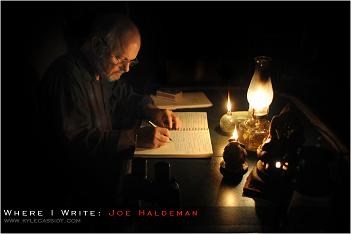How To Create: Motivation for 2010

1. The fantasy workspace.
All artists-- and probably all people-- have in their minds the fantasy workspace. "If I could only work in..." Forget it. This is always going to fail. Always, every single time. They are distractions, they sap emotional and creative energy. You may be surprised to learn/assumed that this blog is written mostly in airports, hotel lobbies (wifi), and on my Blackberry.
Here are some famous authors' spaces. At first glance you might say, cool! but look closely, these are basically cluttered (or bare) offices and areas. They're created out of ordinary necessity. They weren't set up, they evolved over time.
You may try to wave this photo at me:

"Look, he's writing in his fantasy studio." Really? 20 books, with a fountain pen and oil lamps? I investigated:
Real life at home follows a fairly consistent pattern. I get up between three and four in the morning and brew a pot of tea. In the cool months, I make a fire in the fireplace and sit down there to write. When it's warmer, I go out on the back porch. We live on the edge of a few hundred acres of pine forest, and it's pleasant to have the trees and birds and animals out there in the dark while I work.
I do my first drafts in longhand, writing with a fountain pen into blank books. I like the freedom from machinery, and I seem to write more and faster that way than with a computer. It also gives me a definite first draft. Like most people, when I compose on a computer I keep jumping back and forth; by the time I print out a "first" draft, it's actually been worked over a bit... There's no electricity on the porch, so I write between two oil lamps -- making up stories about the distant future, using medieval tools.
Much of this set up is necessity, but in any case he doesn't do it for very long:
After I've finished about 500 words, I quit, and retire to the actual study, which is a book-crammed labyrinth of computer and office equipment.
He has a real study, but writes elsewhere to get the juices flowing. Worth noting that he started writing this way only after he had already published several books.
This is what you are thinking:
"If only I had those kind of materials."
"If only I had better canvas."
"If I only had the Glengarry leads."
"If only I was rich."
Then you'd fail. Creative success is taking what's available and rising above that. The "that" doesn't matter, you'll only be credited with success if you go beyond it. Maybe Picasso had good canvas but he had to transcend an entire way of painting, that's what made him great, not the physical painting itself. Otherwise we wouldn't be buying prints.
For years I dreamed of having the sort of massive oak slab that would dominate a room.... In 1981 I got the one I wanted and placed it in the middle of a spacious, skylighted study... For six years I sat behind that desk either drunk or wrecked out of my mind.... A year or two after I sobered up, I got rid of that monstrosity... got another desk -- it's handmade, beautiful, and half the size of the T. rex desk. I put it at the far west end of the office, in a corner....I'm sitting under it now, a fifty-three-year-old man with bad eyes, a gimp leg, and no hangover....It starts with this: put your desk in the corner, and every time you sit down there to write, remind yourself why it isn't in the middle of the room. Life isn't a support-system for art. It's the other way around.
2. Not starting.
A common piece of advice is "just start!"/don't procrastinate, etc.
Let me explain, however, why this is a cognitive necessity.
No matter how carefully you plan something in your mind-- work through details, procure materials, etc-- it can't take into account everything that happens. Try imagining having sex with Paz de la Huerta; and then try actually having sex with her. The first is masturbation, the second is very tricky, although rewarding, business.
Every creative idea is a dialogue between you and yourself (masturbation); every creative act is a dialogue between you and reality (sex.) You can't account for that other half of the dialogue until you begin it.
Reality takes many forms: the light of a computer screen, the need for the "great phrase" to be surrounded by words that are less inspired; hunger, the need to pee, fatigue, caffeine headaches, hangovers; relentless, crippling, blackening self-doubt. You can never account for these except through action. I don't mean they are necessarily obstacles-- they don't necessarily hold you back-- but the are real success of any creative act is that it transcended reality not by bypassing it, but by going through it.
Or you can just go back to masturbating.
3. "I need peace and quiet!" Not exactly.
In airports and wifi hotspots, I am constantly distracted, usually by women, occasionally by lunatics. However, I get a lot done there because both women and lunatics are scared of me and so I am rarely interrupted. Peace and quiet is valuable, but if every 30 minutes the quiet is interrupted by a phone call or your spouse asks you if you bought the ham, you'll get nothing done. Parents tell teens to turn off the FM radio so they can study better, but that act of telling them is far more distracting than two hours of commercial free Hot97. Sometimes, you interrupt yourself (check email).
This is likely the biggest obstacle to practical creation. Creativity takes inspiration from everywhere, but working on the creation requires concentration, mental focus. Interruptions block this. Imagine again, you are having sex with Paz de la Huerta, and your spouse interrupts you to ask if you bought the ham. Seriously, how are you supposed to work like this?
4. 90/10
You can do 90% of something, but the last 10% takes years, or never gets done. How's that novel coming? Almost done, I'll bet.
It's the same process operational in dating. Long term relationships that never quite make the obvious and natural step of marriage; or furtive glances in a bar that never culminate in an audition: "hey baby, before you got here I thought I didn't really want a blowjob. How 'bout some Jaeger?!"
All of those are the same thing: defenses. Abstractly, they are fears of finality. Not finishing means anything can still happen, your identity remains intact: "I'm a writer."
More concretely, they are a form of self doubt not about the success of executing the act which is in your control-- the writing of the book, the asking the girl out-- but of being able to manage the consequences which are not-- the publishing of the novel, sustaining a relationship/finding a burn unit.
5. Deciding to finish.
It's evident I am not a writer; but each post takes me hours to write, over days. I revise constantly, and still the result is-- well, this. However, at some point I have to overcome my strong wish to revise again (and again and again) and hit submit. First, even though every revision takes the same amount of time, the improvement from subsequent revisions quickly plateaus. Second, unless I hit submit, none of the revisions do anyone any good at all.
I have to decide that it's finished. Read again: it isn't actually finished, I have to decide it's finished. Creative acts require a decision to terminate (e.g. sex with Paz) otherwise it can go on forever.
Some creations, like a novel, are large enough that you don't notice you're avoiding termination. So break a big job into smaller pieces each with definite ends that exist reality.
Example: don't write the novel, blog the chapters. It worked for Dickens. The moment the first chapter goes out your relationship to the book will change. Not just due to feedback, but you'll also find out how much of the novel you really had in you; if it's really a novel or just an idea; if the novel is really a derivative of someone else's. Etc.
If you're scared of the feedback, turn off the comments. The important thing is to do something in reality, not in theory. You can procrastinate a single termination point, but it is very hard to avoid multiple, regular, termination points.
Even for losing weight: "I'm going to lose 10lbs by Valentine's Day"-- it's easy to cheat on your goals and say, "well, I'll just make it up next week." Try, instead, taking a photo of yourself in a bathing suit each week and putting it on the fridge. Or mailing it to me. Or putting it on a blog. Force the idea-- your goal of weight loss- to confront reality regularly, repeatedly, instead of once (at the end). You might say this is going to fail, but if this is going to fail, then you weren't going to succeed anyway.
Happy New Year. You're running out of time.
---
http://twitter.com/thelastpsych
41 Comments